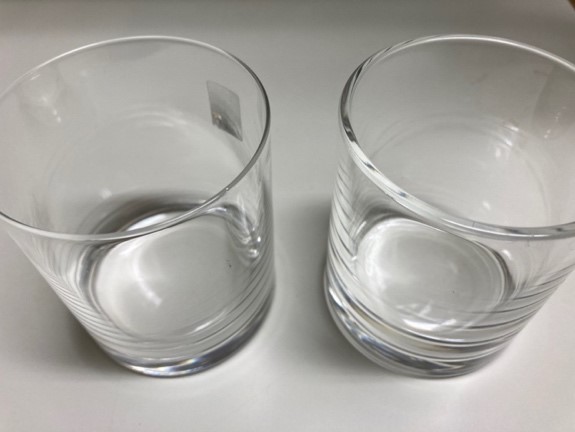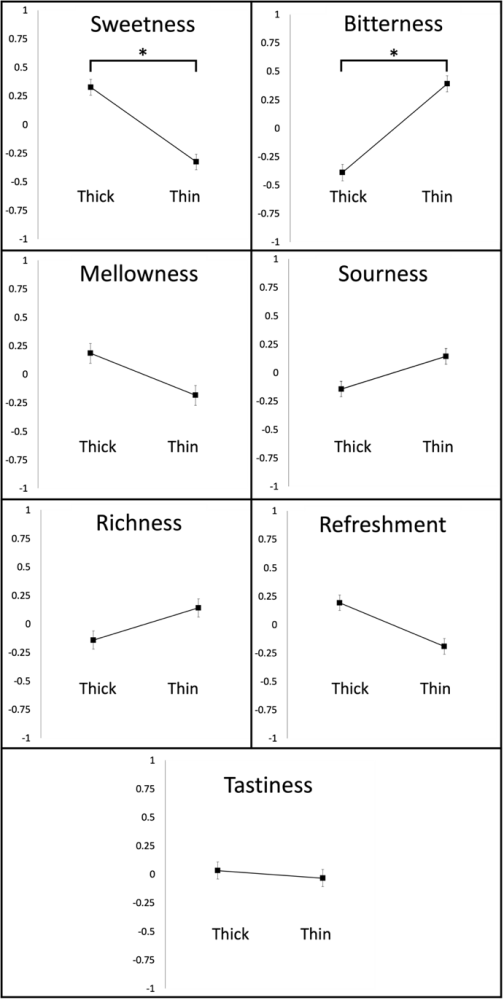2023.06.06
News
Tea tastes sweet in a thick-lipped heavy glasses, tea tastes bitter in a thin-lipped light glasses 〜The tactile thickness of the lip and weight of a glass can modulate sensory perception of tea beverage〜
Abstract
Atsunori Ariga and Koji Matsushita, both the professors of Chuo University, have conducted a collaborate research with the Hokkaido University Graduate School student, Fuka Ichimura, and the lecturer of The University of Tokyo Kosuke Motoki and revealed that the thickness of glass lips when drinking green tea, can influence our judgement of the beverage taste.
Previous research have shown that the material or texture of receptacle has an effect on the taste or aroma of the beverage. The present research have revealed that even if the receptacle’s material and texture are the same, a thick-lipped glass enhances the perception of sweetness in green tea while a thin-lipped glass increase the perception of bitterness. The result indicates that the same beverage can offer consumers a variety of tastes just by manipulating the thickness of glass. In other words, it suggests the possibility of providing preferable drinking experience to individual consumer.
The achievement of this research is published on Online Journal, Food and Humanity (May 27th in Japan time)
Published Journal
Food and Humanity
Title of the thesis: The tactile thickness of the lip and weight of a glass can modulate sensory perception of tea beverage
Authors: Fuka Ichimura, Kosuke Motoki, Koji Matsushita, & Atsunori Ariga
Background
The previous research have revealed that visual and haptic dimensions of receptacles (glass or mug cup etc.) such as its color, shape, material and texture influence one’s taste judgement when drinking beverage (wine, coffee etc.). However, we do not always input or recognize those visual and haptic dimensions when drinking beverage. For instance, the shape of the glass do not come into our sights when drinking beverage.
The present research focused on the thickness of a glass lip where it gives constant input while drinking beverage. It studied the effect a haptic input (through lip) has on judgement of one’s perceptions of beverage taste.
Study and the Result
Thin (1.2mm) and Thick (2.8mm) glasses of the same material were used in the experiment (See figure 1). Participants were blindfolded and were asked to drink unsweetened green teas in room-temperature from a thin- or thick-lipped glasses. Participants judged the sweetness, bitterness, sourness, mellowness, richness, refreshment, tastiness of the beverages each time they drink from the glasses. As a result, the green tea drank from a thick-lipped glass were rated more sweet than a thin-lipped glass one, and the green tea drank from a thin-lipped glass were rated more bitter than a thick-lipped glass one (See figure 2). As the participants were blindfolded, it can be suggested that haptic input from lip influenced the participant’s perception of green tea taste.
Besides difference in the thickness of a glass lip, also the weight of glasses used in the experiment were different, so whether the weight of glasses influence the participant’s perception of taste or not had been further examined. As a result, the above findings cannot be fully explained just by the weight of glasses, but it can be said that glasses weight were one of the important factors which influenced the participant’s judgement of taste. In other words, when a glass lips’ thickness and a glass weight are combined naturally, the thickness of glass lips will influence one’s perception of green tea taste.

Figure 1. Glasses used in this research (Left: thin-lipped glass, Right: thick-lipped glass)

Figure 2. The result of thick-lipped glass enhance sweetness and thin-lipped glass increase bitterness were revealed
The result of this research indicates that the same beverage can offer consumers a variety of tastes just by manipulating the thickness of glass lip. In other words, it suggests the possibility of providing preferable drinking experience to individual consumer. Companies providing service such as restaurant, café, pubs and bars, need to select an appropriate thickness of glass lip in order to provide consumers a desirable beverage experience (sweetness or bitterness).
In addition, the study provides an indication on the following modern business issues. Recently, the world is reducing the usage of plastic straws with an aim to facilitate environmental friendliness. As you can tell from the increasing numbers of companies in Japan that replace plastic straws into paper straws, same goes for the Japanese society. However, there is a possibility of consumers perceiving different taste in same beverages, since the haptic on lips differs between these two straws. The study suggests the importance of investigating the changes in taste perceptions, which results from the use of environment friendly straws. Further research is expected among this area.
※This study was supported by T. HASEGAWA. Co., LTD.
<Contact> Atsunori ARIGA
TEL: 042-674-3711(Office of Faculty of Letter)
E-mail: aariga413@g.chuo-u.ac.jp
